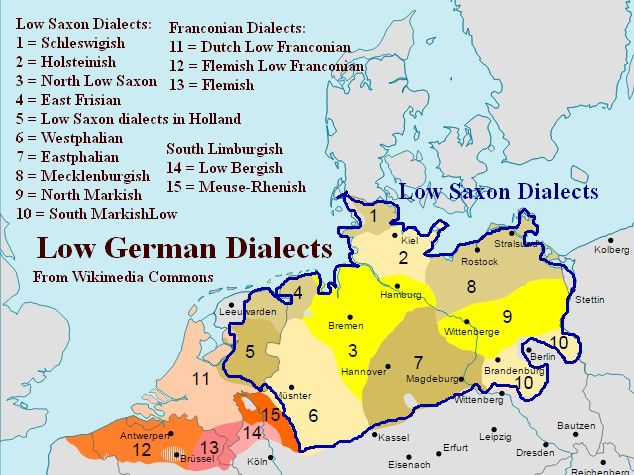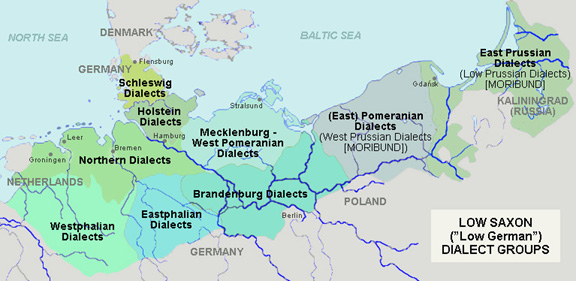If Prussia will lose the Seven Years' War and thus lose Silesia to Austria, then it would essentially become a Giant Saxony, no? Especially if it will still manage to eventually annex Hanover at some future point in time.
In practice, yes. Of course, this is well after Luther's translation of the Bible, which was a major factor in the process of codifying the Central German dialect varieties into what we know as "modern German". And Prussia had adopted Luther's creed and his Bible. (In the much the same way, the offical -- Protestant -- Dutch translation of the Bible ended up deterimining which dialect became the basis for the "official" language.)
This means that while this ATL Prussia may cover much the same extent as the historical Saxon
Sprachraum, and while many of its inhabitants (especially in rural areas) will still speak Saxon for a long time, its official language will be much like the German we know from OTL.
And of course, this also means there's no
secession, as such. It's more that (Saxon-)Prussia remains independent from the start, and a united Germany never forms. Presumably, the Habsburgs retain primacy over everything South of Prussia, within the confines of the HRE. So at most, we'll see Prussia eventually deciding to just outright step out of the HRE. Does that count as their secession?
I think that to get real
Saxon secessionism going, we need to look at scenarios that preserve the Hanseatic League, and which prevent any non-Saxon language variants from becoming the official language imposed on the Saxon
Sprachraum.
I could see an ATL where the Hanseatic League, fearful of the Holy Roman Emperor's ambitions, plays a careful game in aligning itself with the Papacy against Impetial power. This affects the Investiture Controversy, and the short-term outcome is that the Pope wins earlier, more overwhelmingly, and with Hanseatic support. (The Emperor essentially finds the Church and the mercantile power algned against him.) A long-term outcome is that the Hanseatic League, for its efforts, wins considerable independence from the Emperor. It remains formally within the HRE, but its territories (which grow to cover the entire Saxon
Sprachraum) gradually become independent from the traditional feudal relations.
In this manner, the entire Hanseatic League becomes a giant mercantile proto-Republic
within the HRE. Its people speak Saxon by default. The various dialects of Saxon will soon blend together into an (initially) informal "Traders' Saxon" which most everyone understands. Ultimately, this will become the basis for a modern, official Saxon language.
A POD this early presumably prevents the Reformation as we know it, but probably sets the contest between Pope and Emperor up for another round later. Regarding the Reformation, this means that there's no Dutch Protestant translation of the Bible, which means the Low Franconian that evolved into modern Dutch in OTL will probably end up being supplanted by Saxon instead. A reverse of OTL. The Franconian dialects (Hollandic, Flemish, Brabantian, Limburgish) will become regional farmers' dialects, threatened with extinction, while Saxon will supplant them as the common tongue. I think that the entire Netherlands will be absorbed into the Hanseatic League, step by step. Eventually, the Hanseatic League would presumably turn Kales (Calais) into its South-Westernmost city.
As the Holy Roman Emperor eventually dukes it out with the Pope, the Hanseatic League sides with the latter again. I think it'd end with a rump-HRE renouncing the overlordship of Rome (possibly in a move akin to what Henry VIII pulled in OTL), while the Hanseatic League remains staunchly Catholic and secedes from the HRE. In this, it declares its independent nationhood, and its separate Saxon ethno-linguistic identity. (If this is paired with Romantic nationalist impulses of the sort seen in OTL, I could see them defining this as a historical "revenge" against Charlemagne and the Franks, who once subdued the Saxons by force.)
(Depending on how relations between the Hanseatic League and Scandinavia are, the later could either remain Catholic, or side with the Emperor in renouncing Rome. Personally, I'd expect a series of Hanseatic-Danish conflicts to have been fought already, probably with the Hanseatic League winning, suborning and ultimately annexing Denmark, and making a pact with Sweden and Norway. So I would consider it likely that relations with those two would be pretty good.)



